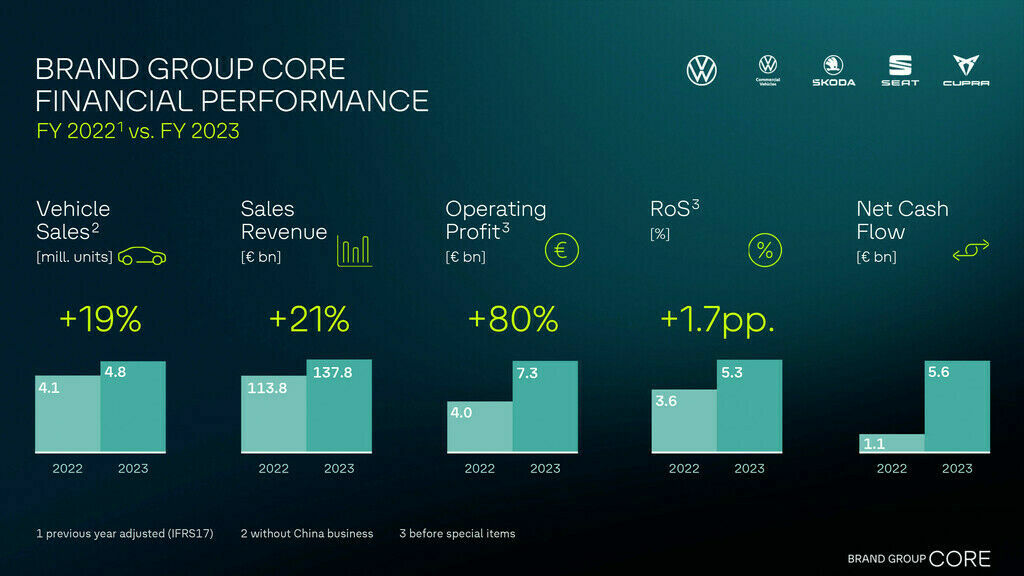The systematic expansion of cooperation in the agreed cross-brand core action areas is having a sustained positive effect on key financial performance indicators: Brand Group Core operating profit before special items in 2023 grew 80% year-on-year to 7.3 billion euros (2022: 4.1 billion euros). The main driver here was a 19% increase in unit sales to 4.826 million vehicles (2022: 4.069 million vehicles). Net cash flow increased from 1.1 billion euros in 2022 to 5.6 billion euros. This development was chiefly attributable to the one-off reduction of inventories that largely corrected the inventory build-up due to the shortage of logistics resources in the previous year. The operating return before special items improved by 1.7 percentage points to 5.3% (2022: 3.6%), sales revenue climbed 21% to 138 billion euros (2022: 114 billion euros).
Thomas Schäfer, Member of the Board of Management of Volkswagen AG, Head of the Brand Group Core & CEO of the Volkswagen Passenger Cars Brand, said: “The closer cooperation in the Brand Group Core is gaining traction. Our work is beginning to pay off. Our networking has become stronger and more systematic. We now have several projects where cooperation extends beyond former brand boundaries. We have the right team spirit. As the volume brands’ CEO team, we have pushed hard to drive this transformation forward in recent months. Our common goal: to fully exploit our performance potential as a brand group by sharing knowledge and working together to find the best solutions. With our strong, clearly differentiated models we ideally cover important market segments without cannibalizing business for our sister brands. And our networking will become ever closer in order to leverage our enormous combined potential even more effectively in future under difficult economic conditions and within a rapidly changing automotive industry. That is good for each brand, for the Group and for our customers.”
Key figures for the Brand Group Core:
| Key financials | 2023 | 2022 | Change 23/22 |
| Unit sales | 4,826,276 vehicles | 4,069,342 vehicles | +19% |
| Sales revenue | 137.770 billion euros | 113.762 billion euros | +21% |
| Operating profit before special items | 7.273 billion euros | 4.045 billion euros | +80% |
| Operating return before special items | 5.3% | 3.6% | +1.7%-points |
| Net cash flow | 5.625 billion euros | 1.131 billion euros |
All the individual brands Volkswagen, Škoda, SEAT/CUPRA and Volkswagen Commercial Vehicles contributed to the positive overall performance of the Brand Group Core – and thus also the Volkswagen Group – in the 2023 fiscal year.
Unit sales at the Volkswagen brand grew by 13% to 2,519 million vehicles (2022: 2,236 million vehicles) in the 2023 fiscal year. The brand’s sales revenue climbed to 86,4 billion euros (2022: 73,8 billion euros). The main drivers here were the license business with China and a strong performance in after-sales business. The operating profit before special items of 3.5 billion euros (2022: 2.6 billion euros) also mirrors the new focus on efficiency and profitability. At 4.1%, the operating return before special items was 0.5 percentage points above the figure for the previous year (2022: 3.6%). The improved operating result in 2023 shows that the brand is strengthening its resilience and improving its competitiveness. Given the increasing intensity of competition worldwide and the associated enormous pressure on prices and costs, the performance program agreed last December will contribute to stabilizing the return on sales trajectory from 2024. The Volkswagen brand is thus laying the groundwork to reinforce resilience in a persistently challenging market environment.
Patrik A. Mayer, Member of the Board of Management of the Volkswagen Brand responsible for “Finance”, commented: “The solid results for the 2023 fiscal year show we are becoming more financially robust. Volkswagen is the Group’s core brand and we must live up to our responsibility – with good products, and also with good figures. Systematically implementing our Accelerate Forward performance program will make us significantly more effective and faster by 2026: not only in our factories and in development, but also in administration and sales. We therefore believe we are well prepared for a demanding year in 2024 with its muted economic outlook.”
Škoda Auto also reported a successful 2023 fiscal year. Global unit sales by Škoda Auto last year ran at 866,800 vehicles (+18,5%), with the all-electric Enyaq recording the highest growth (81,700 vehicles sold; +52%). The all-electric model was one of the best-selling electric vehicles in many European markets. The Škoda Auto Group reported record sales revenue of 26.5 billion euros in 2023 (2022: 21,0 billion euros; +26,2 %). The brand’s operating profit before special items came in at 1.8 billion euros, 183% higher than the prior-year level (2022: 0.63 billion euros).
At 6.7%, the operating return before special items was well above the level of the previous year (2022: 3.0 %). These strong results underpin the company’s robust business model for making the necessary investments in the ongoing transformation to e-mobility.
SEAT/CUPRA put on a convincing performance last year with a marked 28% rise in unit sales to 602,000 vehicles (2022: 468,000 vehicles). The brand reported 31% growth in sales revenue to 14,3 billion euros (2022: 10,9 billion euros). Operating profit before special items ran at 625 million euros, well up on the previous year’s figure of 33 million euros. The group-wide increase in profitability is clearly visible: the operating return before special items rose to 4.4% (2022: 0.3%). This is chiefly attributable to the success of CUPRA with higher unit sales and positive effects from efficiency improvements.
Business development at the Volkswagen Commercial Vehicles (VWN) brand was also positive: unit sales increased by some 25% to 423,000 vehicles (2022: 340,000 vehicles) and sales revenue grew 34% to 15 billion euros (2022: 11 billion euros). Furthermore, there was a 65% rise in operating profit before special items to 873 million euros (2022: 529 million euros). Progress with driving profitability was confirmed by an increase in the operating return before special items to 5.7%, compared to 4.6% in the previous year. This record performance is attributable to the brand’s robust positioning. Vehicles for private and commercial customers, the iconic ID.Buzz and the distinctive California models satisfy individual customer wishes. This performance was achieved through the systematic implementation of the efficiency program at VWN and the associated cost discipline.
Outlook
The Brand Group Core plans to increase its result in 2024, bolstered by the related effects from the volume brands’ ongoing performance programs.
Overall, the Brand Group Core continues to target an operating return of 8% in 2026. Improved cooperation among the sister brands is expected to leverage synergy and scale effects and contribute to achieving this target. This includes optimizing product costs, reducing overheads under the various performance programs in place at the individual brands, and thereby safeguarding sustainable growth. In addition, the Brand Group Core plans further volume growth as a result of the improved supply situation for critical raw materials and components. Further growth in key regions (e.g. North America) as well as the development of new markets (e.g. Škoda Auto / Vietnam) are expected to have a positive effect on return. The current fiscal year will be shaped by strong competition, political challenges and the necessary investments for the future. Clear-cut responsibilities and a task-sharing approach form the basis for the strong cooperation that will continue to drive the success of the Brand Group and the entire Volkswagen Group in future.
Organizational note:
Škoda Annual Press Conference Friday, March 15, 10:00 a.m.
VWN Annual Press Conference Thursday, March 21, 09:00 a.m.
SEAT/CUPRA Annual Press Conference Thursday, March 21, 11:00 a.m.






